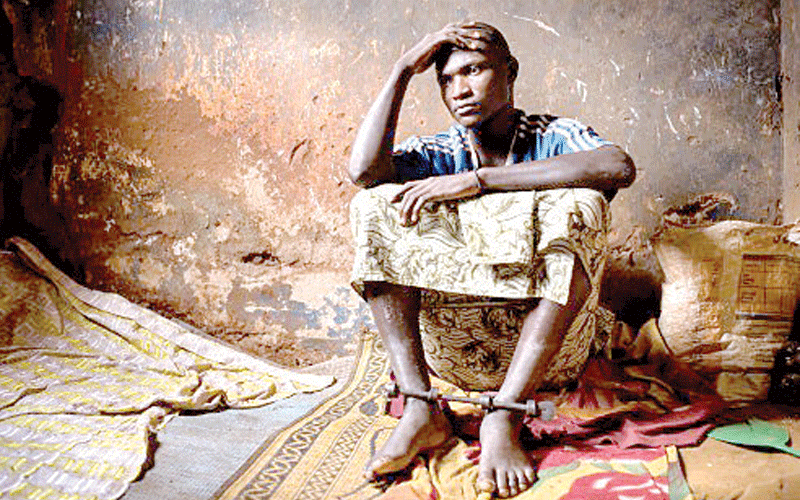Ban chaining of mental health patients – reports

Evelyn Makena @evemake_g
Imagine spending weeks, months and even years confined in a small space.
Then chained with shackles to restrict your movement and forced to eat, urinate, defecate, sleep within that small radius.
This is the plight of hundreds of thousands of people living with mental health conditions around the world according to a damning report by Human Rights Watch (HRW).
The report, Living in Chains: Shackling of People with Psychosocial Disabilities Worldwide, reveals that men, women and children are shackled against their will in 60 countries in Africa, Middle East, America and Europe.
People living with mental health conditions are shackled by their families at home, in religious and traditional healing centres and even in state-run psychiatry institutions under inhumane conditions.
Adequate services
“Shackling people with mental health conditions is a widespread, brutal practice that is an open secret in many communities.
People can spend years chained to a tree, locked in a cage or sheep shed ,” said Kriti Sharma, senior disability rights researcher at HRW and author of the report.
Kriti notes that, families of people with mental illness resort to this measure to cope since governments have failed to provide adequate mental health services.
Globally, one in 10 people live with mental health conditions, yet governments spend less than two per cent of national budget to provide relevant health services.
The lack of government support coupled with lack of awareness forces families to turn to shackling to protect loved ones from hurting themselves.
HRW interviewed 800 people and found evidence of the practice in 60 countries, 20 of which are in Africa including Kenya.
“I have been shackled for five years and the chain is so heavy it makes me sad,” revealed Paul, a mental health patient from Kenya interviewed during the compilation of the report.
He stays in a room with seven other men and is forced to go to the toilet in a bucket.
The over 60 mental health patients confined in a church in Kisumu are forced to wear undergarments only, to prevent them from escaping or hanging themselves using the their clothes, despite still being given blankets and mosquito nets.
Sexually abused
In state-run and religious facilities where mental health patients are shackled, they are often forced to fast, are denied food, or forced to take herbal concoctions, and are physically and sexually abused.
Michael Njenga, Executive Director, Users and Survivors of Psychiatry Kenya says that the country has placed emphasis on biomedical approach that focuses on pharmaceutical treatment for people with psychosocial disabilities and mental health conditions.
The approach is inadequate as it fails to put patients’ human rights into consideration.
“It is important to develop wide range of community based health services that respond to needs of people with psychosocial disabilities and most respect their autonomy, choice, dignity, privacy and offer family support,” he says.
Njenga notes that mental illness is shrouded in myths and misinformation with culture and religion playing a huge role in its interpretation.
In many communities, it is associated with sinning, curses or witchcraft hence why families turn to religious institutions for healing.
“There is need to have conversations with community to change attitudes on practice that violates human rights and dignity of people,” he says.
Due to the stigma and shame of the practice, shackling remains largely invisible as it is done in great secrecy.
This, Sharma says has made it difficult to collect data and spur regional and nationwide action to end it.
Limited spaces
Shackling leaves both physical and emotional scars. It has been linked to post traumatic stress disorder, malnutrition, nerve damage, infections and cardiovascular problems.
The Covid-19 pandemic has put shackled people at even higher risk of infections.
“Because people are shackled in limited spaces and in unsanitary conditions it exposes them to the virus,” says Sharma.
In Kenya where most grassroots interventions on mental health heavily rely on social workers and community health volunteers, services were disrupted due to movement restrictions.
Unveiling the report on Tuesday, Sharma called on governments to ban the practice of shackling both in policy and practice and combat stigma in collaboration with organisations of people with psychosocial disabilities.
“We are asking governments to invest in quality and affordable community services not restricted to mental health services, but holistic including access to housing, education and employment,” she says.











